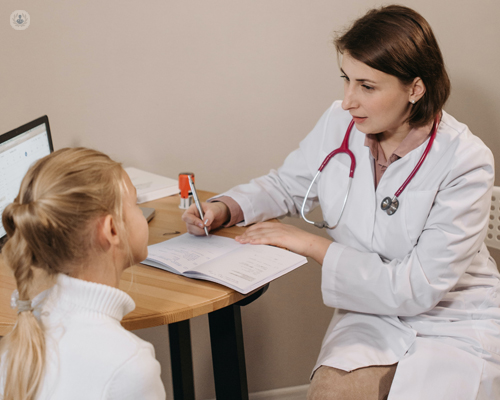Allergies in children (Part two)
Written by:The number of children in the UK that have allergies has significantly grown. Senior consultant paediatrician Dr Basheer Peer-Mohamed has created an informative and thorough guide for parents looking to inform themselves about diagnosis and treatment.
Types, causes and symptoms for child allergies are also covered in this two-part article. Read part one, here.

How do you diagnose allergies in children?
It is important to clearly establish if your child has had an allergic reaction or not and in order to do that, I will take a thorough history, going through the event in detail, looking at the pictures of the reaction taken at the time, if available, and other medical problems that might be present including family history followed by a detailed clinical examination. Following the clinical assessment, specific tests such as allergy blood tests or skin prick test will be performed to confirm the diagnosis and to identify if there are any other potential allergies or hypersensitivities that your child might have.
Is there a difference between skin prick test and allergy blood tests?
Yes, there is. This is mainly to do with how the test is performed. A skin prick test is performed using reagents for different allergenic substances or sometimes using fresh foods. The procedure is performed in the clinic and is usually well tolerated by infants and children. The advantage is that the result will be available within about 20 minutes. The allergy blood test, obviously, is performed on a single blood test and although it takes a few days to a week to get the results back, the advantage is that a lot more substances could be tested in one go than with the skin prick test.
Which of these tests is better for diagnosing allergies in children?
The choice of the test will depend upon a number of factors depending upon the symptoms, presence of other medical conditions such as:
Both the tests have a more or less comparable track record in identifying allergies and with respect to the rate of false negative results.
What is the treatment for allergy?
The key strategy in allergy treatment is avoidance of contact with the allergen. Unfortunately, despite careful attention, sometimes accidents do happen and especially from cross-contamination with other foods such as in parties and school meal times. And it is for this reason, it's crucial that the child has access to an antihistamine medicine at all times. The common antihistamine medicines are Chlorphenamine (Piriton) and Cetirizine. These medicines should be given as soon as possible at the first hint of a reaction.
In the case of a severe allergic reaction, further treatment such as with adrenaline injections or admission to hospital might be needed. In infants with cow's milk protein intolerance, once the diagnosis has been made, avoidance of cow's milk or the use of modified cow's milk formula will lead to resolution of the symptoms. It is also helpful to bear in mind that some food allergies such as milk and egg allergy can resolve by themselves with time, but children will need careful monitoring until then.
If you’re interested in seeing an expert allergy consultant to assist your child, make an appointment with Dr Peer-Mohamed via his Top Doctors profile.


